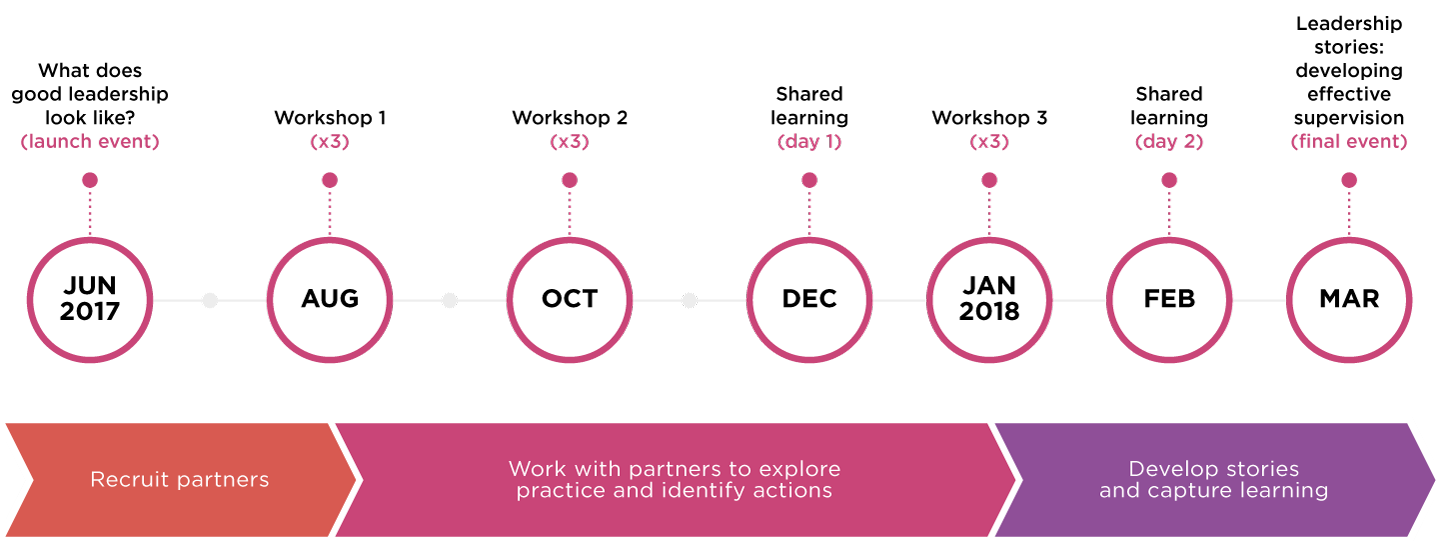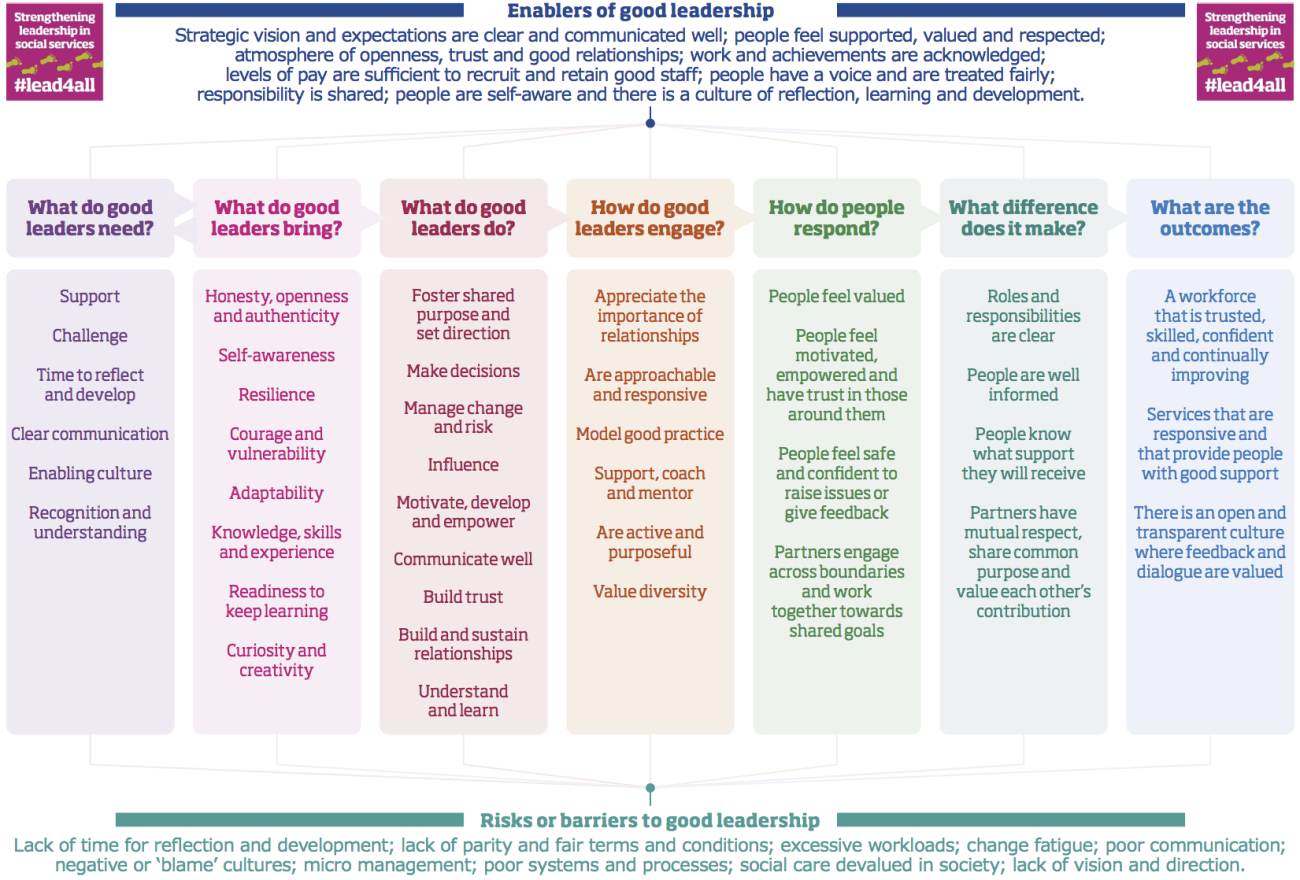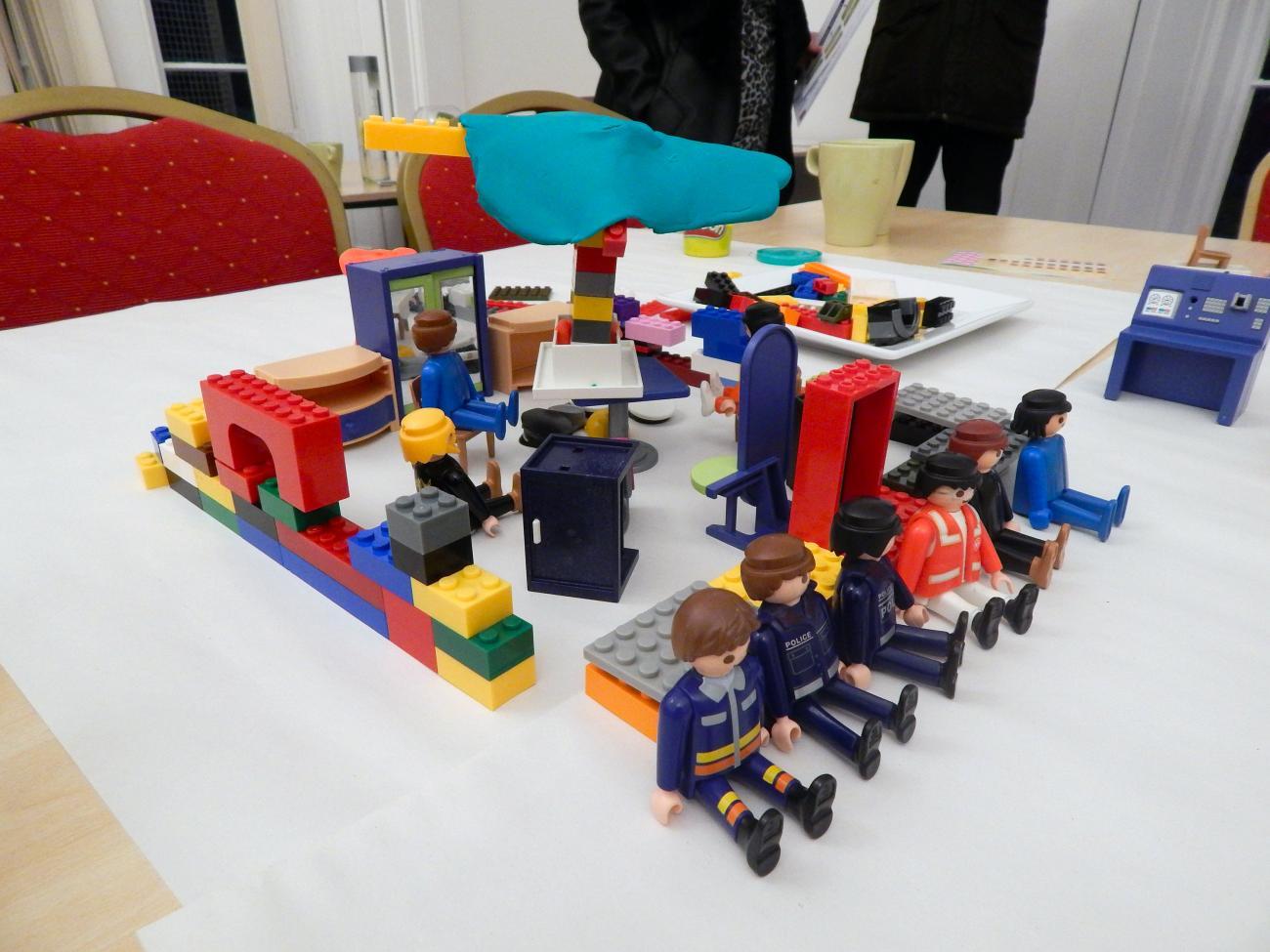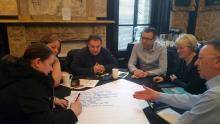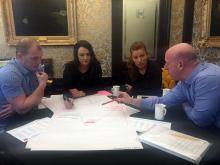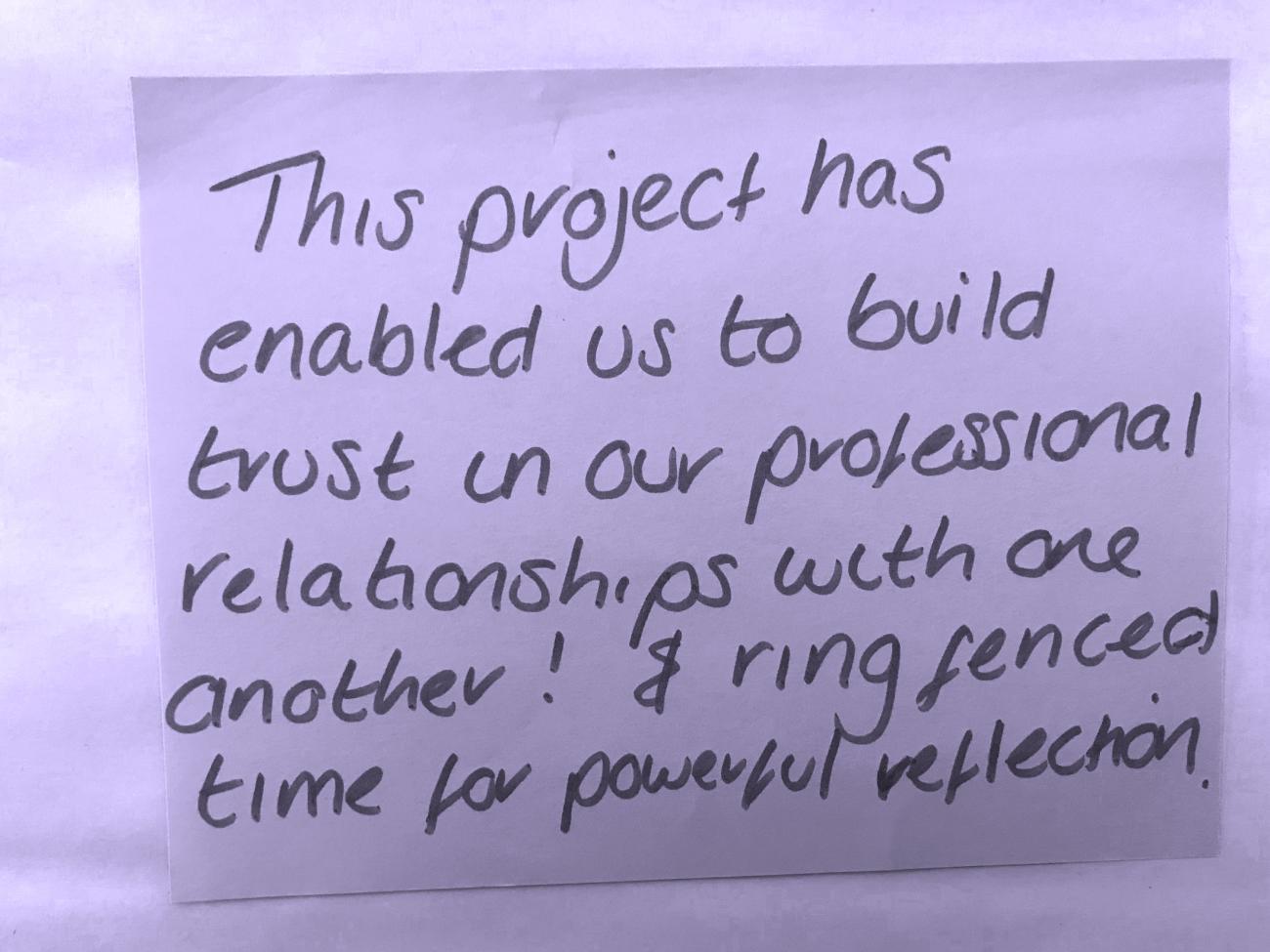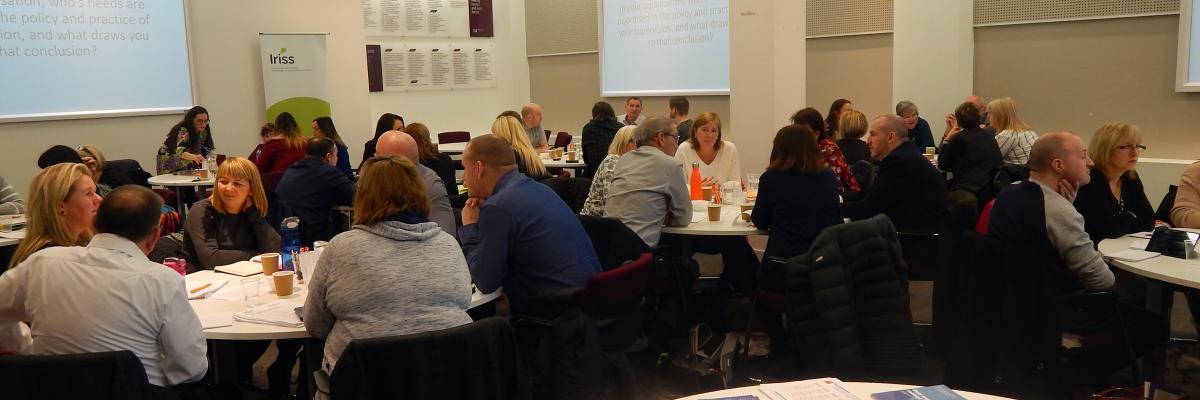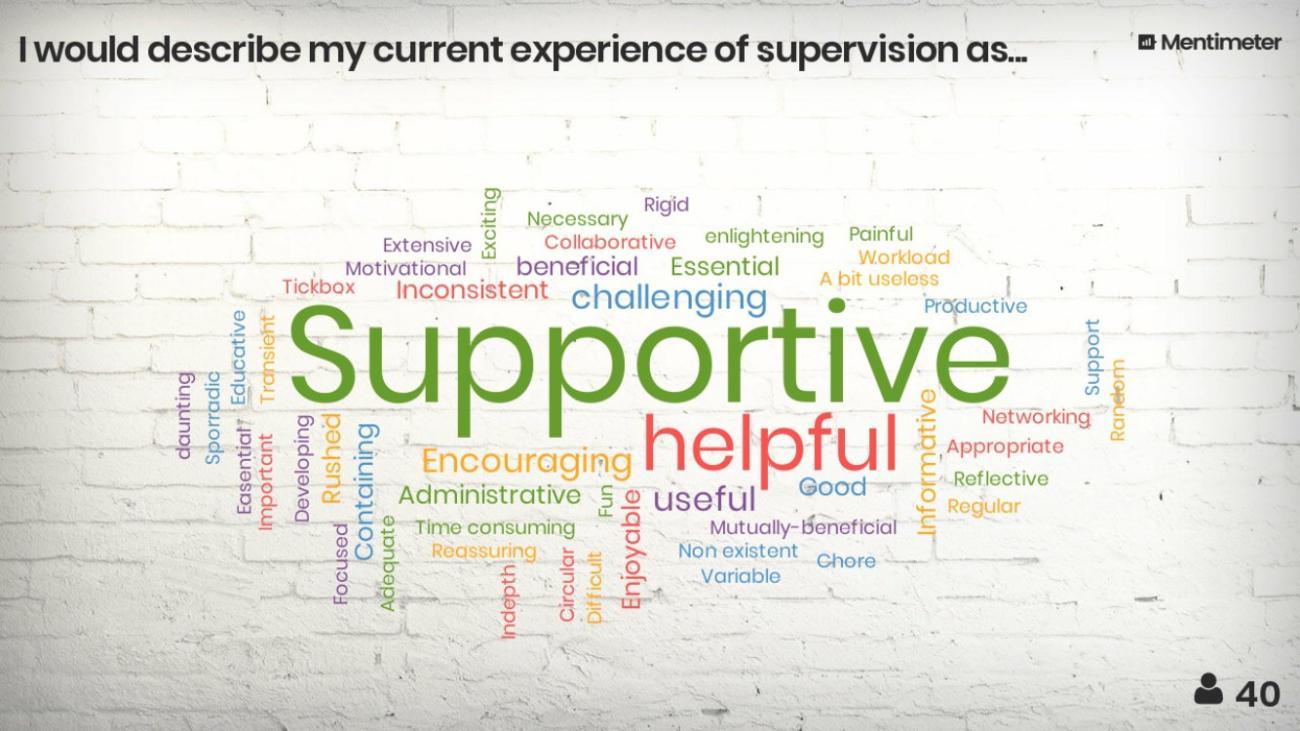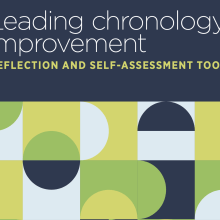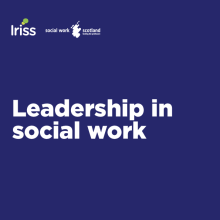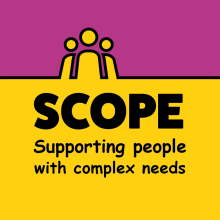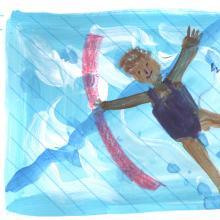Background
This page takes you through the process we used to engage partners and others with the Leadership stories: developing effective supervision project. We wanted to create this to be transparent about the time it takes to do this collaborative work, and acknowledge the commitment given by the partner organisations. We also wanted to highlight the processes and approaches used, and feedback gained, at the different stages of the overall project.
The timeline
June 2017: What does good leadership looks like?
On 1 June 2017, 50 delegates from social care and support across Scotland joined us to explore the leadership logic model. This included people reflecting on how they could use this model within their workplace, and considering the factors which may hinder or encourage good leadership development. This summary report features more detail about the day.
Access the pdf version of the Logic model
Overall the event was successful and people told us they were most inspired by:
The way in which the logic model can be understood beyond a clinical abstract framework to something practical and meaningful.
How clear the model is and how it is broken down – reflecting on good leadership examples of my own.
Following the day people were committed to:
Go back to work and finalise staff team development days and use the logic model for these days. I will share information at senior manager days.
Give more feedback to individuals when they are doing positive work demonstrating leadership.
Try to be braver in my leadership and trust my instincts/learning/knowledge and experience.
We used this event, and a wider call through our networks, to recruit partners to take part in the process. We deliberately wanted to work with one statutory sector, one third sector and one independent sector organisation. We asked organisations to apply, outlining why they were interested in taking part, what areas they wanted to explore specifically, and what success would look like for them as a result of being part of the project.
August 2017: Workshop 1
We then organised initial workshops with each of the participating organisations, with one Iriss and one SSSC member being at each workshop. Partners expected the first workshop to focus on making practical changes to their current supervision policy and procedures:
For the first workshop there was an expectation that they (SSSC/Iriss) would supply a degree of leadership training to enhance the supervision process, and that the team would learn a few tricks for developing a more authoritative stance. However, the project proved far more complex and self-analytical than anticipated.
Nether Johnstone House
They (the staff team) were looking for technical answers to the issues that they had identified in their supervision processes, and they expected that the process would be fairly quick and easy.
Simon Community Scotland
In fact, the first workshop encouraged the participants to reflect on why they wished to develop aspects of their supervision and examine what success would look like for each of them. The SSSC/Iriss approach was to facilitate discussion and help the project partners to identify what they want to change and how they wanted to go about that change. The real key was in asking good questions, and allowing both time for discussion and silence. Partners initially explored their best experiences of leadership and supervision using an appreciative inquiry approach. This revealed a lot of similarities around the core messages of what people value and what these things should, and can, be. It also helped them keep that in focus to develop their discussion. Referring to the SSSC Supervision Learning resources, partners were then asked to consider why they do supervision at all and explain what supervision meant to them. This led to individuals exploring more deeply their assumptions about who supervision is for and the outcomes that good supervision can lead to. You can see some of the tools we used within the SSSC Appreciative Inquiry resource pack.
During the final event at the end of the project the House Manager from Nether Johnstone highlighted the value they placed on the appreciative inquiry approach. He thought it was useful as it kept the focus on appreciating the best of what currently happens, envisioning what might be, and exploring what should be in the future. This thinking turned the conversation they expected to have on its head.
In that first workshop, the Dundee City Council team visualised what an ideal supervision session would look like:
Each element of what they built represented something they thought was important in supervision:
- The walls – protected time and space
- 3 chairs – service user 'in' the room
- Pile of hats – two-way conversations
- Mirrors – to allow reflection and thinking time
- Umbrella – represents organisation/environment/context
- Figures outside the room – people outside ready to help and support
- Table underneath umbrella – shows solidity and support of management
- Toolbox – represents all the skills and experiences that are being taken into the supervision context and are ready to be used.
Partners told us that what they were taking away from the first workshop was:
We need to put ourselves in the shoes of the staff – listen!
That it's not my supervision
Thinking about the central task and reflecting on the why and how
There was clearly a lot more work to do that the team had not expected
At the end of workshop 1, each organisation went away with different actions that they wanted to explore and reported on them at the beginning of workshop 2. The appreciative inquiry approach, and giving time for exploration and discovery, allowed these actions to be very different for each organisation.
October 2017: Workshop 2
Before workshop 2 each partner had committed to carry out this additional work and actions. For Simon Community Scotland this included a staff survey followed by a revised supervision policy and new supervision contract being piloted with a small group of staff. For Nether Johnstone House it involved repeating the appreciative inquiry questions with a wider staff team to gauge what staff felt about supervision. Finally, for Dundee City Council participants, it encompassed reflecting on their own experiences of how they receive supervision and using that to influence both the supervision they receive and deliver to their own teams.
The second workshop invited partners to develop plans about what they needed to do to take forward the information and thoughts they had gathered from their colleagues. For Simon Community Scotland and Nether Johnstone House we also helped them develop logic models around the work we carried out in workshop one:
th{background-color:#8cbfd8 !important;color:white !important;}
| Underlying values |
|
|---|---|
| Current issues identified |
|
| Workshop 1 action |
Staff development day - leadership and supervision
|
| Following actions (to be developed) |
Immediate actions
Future actions
|
|
Short to medium-term outcomes |
|
| Long-term outcomes | Better experiences for young people in our care |
| Underlying values |
|
|---|---|
| Current issues identified | Variation of supervision experience across the organisation – e.g. different in Glasgow / Lanarkshire and between Outreach and Residential |
| Workshop 1 action |
|
| Following actions (to be developed) |
Pilot with 14 to test out:
|
|
Short to medium-term outcomes |
|
| Long-term outcomes | Better outcomes for staff and people accessing support |
These logic models helped connect the actions of the project up with the ultimate outcomes, while acknowledging the values that underpin what was being done. It also helped partners explain to others what they were doing and keep focus and boundaries around the activity. These logic models were flexible and partners adapted and changed them as the project progressed.
For Dundee, the action was very different. Much of the conversation between the three team managers (as mentioned in the SSSC and Iriss reflections) was about how they can effectively rid themselves of the 'monkeys' on their back – other people's responsibilities that cling to them and prevent them managing efficiently. This was something common that they had experienced in their work and also read about (specifically in the book, The One Minute Manager Meets the Monkey), so after workshop 2 they went away to explore how they could change their own experiences of supervising and being supervised to address this challenge.
Some of the feedback we got from this session:
Feeling a lot clearer and less in shock at the end of this session. I can see a plan.
Thought provoking and could have led onto wider avenues of staff/management/service
I think these are revealing as workshop 1 was a bit of a surprise to some participants, in the sense that the approach and discussions led them to having a very different conversation to what they envisaged. The second workshop then helped contain that feeling and identify a route forward.
December 2017: Shared learning day 1
The first shared learning day introduced the project partners to each other and followed an action learning approach. The idea of this was to share experiences across those who were participating, and for them to help each other come up with solutions for the challenges they were facing. Each partner brought along a question related to an issue they faced with developing more effective supervision. These were:
- How do we encourage meaningful ownership of, and participation in, a group supervision model? (Nether Johnstone House)
- How can we reflect on our own supervision, what we get from it and how we lead, as opposed to taking the problems 'monkeys' of others? (Dundee City Council)
- How can we fit this project to a wider project of using the continuous learning framework? (Simon Community Scotland)
These questions were discussed in groups and with suggestions on ways forward and possible next steps being fed back to the organisations that posed the above questions.
The project was thankful to Loretto Care for presenting how they had developed their supervision training for newly recruited supervisors (using the SSSC Supervision Learning Resource) and how group supervision supported the needs of some staff teams within the organisation. Again, they spoke about the value of asking why do good supervision at all, and what is good supervision.
On the day people told us the session was:
Really good and helpful in discussing, exploring and sharing ideas about supervision
Brilliant opportunity to come together and learn from different organisations
Most useful was:
Others ideas encourages you to think outside the box. Our peers simplify/strip back issues which we possibly create ourselves
One manager reported she felt 'braver in supervisions with her team members. This has been bolstered by meeting other organisations who are part of the leadership and supervision project and getting thoughts and ideas from them on how to take things forward.'
Another said that 'Although the project began in August, I have quickly realised that change doesn't happen overnight and the process of embedding the leadership logic model in the supervision experience for staff is in its infancy.'
The above quote is from one of the participants, Lynsey Morrison, from Nether Johnstone House. Lynsey wrote the below assignment as part of her university course (MSc Advanced Residential Childcare, University of Strathclyde) using her experiences from this project as part of her insight.
January 2018: Workshop 3
The third workshop invited partners to reflect on progress and provided an opportunity for them to consider how they had worked as a team, and to review the project as a whole. We made sure throughout the process that we gave adequate time to reflect, to explore, and then to identify actions and timelines for next stages. Participants told us this was key as they found it very hard in their 'everyday' to find the time to reflect and commit time to be together as a staff team and have the type of expansive discussion they had in our sessions.
February 2018: Shared learning day 2
This session asked partners to summarise the project and evaluate the developments they had completed. It was during this day that we began to draft stories of the work achieved with the help of Sam Rowe from the Village Storytelling Centre, ready to present at our final event taking place on 7 March 2018, and also be used in this resource.
Some of the participants reflected after this day:
Looking back on our organisation's journey and the steps taken over the past few months to get to where we are. We've come so far but we've further to go. Continue the momentum.
This project has helped us develop a journey we had already begun, but gave us better direction.
As the team become more reflective, the culture in the office begins to shift.
As is represented strongly in the audio stories, the individuals and organisations viewed this process as the start of something bigger for them. As much as the involvement of Iriss and the SSSC came to an end in March 2018, that did not mean that the organisations had finished developing their work around leadership and supervision.
March 2018: Leadership stories, developing effective supervision
On 7 March 2018 we were joined by 58 delegates from across social services to hear the partner's stories of how they had developed more effective supervision and the changes this had created to their practice.
At the beginning of the day we asked participants, in one word, to tell us about their current experience of supervision:
There was some really encouraging words here – 'supportive', 'helpful' and 'beneficial', but there were also a lot that were somewhat worrying. 'Inconsistent' and 'rigid' aren't great, but most damaging are ones that state supervision as 'painful', 'rushed', or even worse 'non-existent' and 'a bit useless'. This seems to show a representative spread of supervision experiences that we have heard through our work on supervision over the last few years in the sector.
The focus of this day was very much on hearing from the three participating organisations about their journeys and stories and using those as the basis of discussion for participants who came along. We were also lucky to have Karen McCulloch from Includem talk about some of her experiences of leadership, supervision and relationships, as well as a presentation from Robert Kelman from SSSC who shared the findings of the SSSC supervision and management qualification consultation.
We introduced gratitude jars at the event. These encouraged delegates to focus on what they were grateful for and attracted comments such as:
Thankful to have a number of knowledgeable peers at our table
Grateful that our organisation is small enough to be responsive and innovative about supervision development compared to other large organisations
Grateful to realise that many organisations face the same supervision challenges as we do
I am grateful I work for an organisation and directors who allow us to enforce positive change without risk being at the forefront
I feel fortunate for opportunities to improve myself as a person
When asked what they were taking away from the day, participants stated:
Supervision to be more about staff wellbeing
Not to assume anything and check what reality is for individuals
Thinking of ways to incorporate group supervision to more dispersed and remote services
To reflect on why we do supervision
To ask if our policy is fit for purpose
Resources
- The strategy for enhancing the leadership capability of Scotland's social services
- Enabling leadership research
- Leadership logic model
- Appreciative Inquiry resource pack
- Supervision learning resource
- Achieving effective supervision
- Leading change in supervision
- Iriss website
- Step into Leadership website
Acknowledgements and thanks
Iriss and SSSC would like to thank all the individuals and organisations mentioned in this resource and who took part in the work. It was particularly inspiring to work alongside the project partners who were so passionate and dedicated to delivering great support and care to the people they work with.
